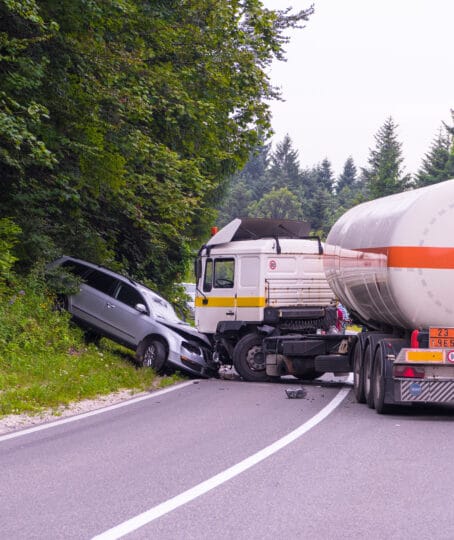EXPERIENCED TRUCK ACCIDENT LAWYER in PEORIA
Collisions between large commercial trucks and other vehicles often result in catastrophic injuries. Because of this, the financial burdens that accompany these types of crashes are generally astronomical.
Our Peoria truck accident lawyers stand strong against large trucking corporations and powerful insurance companies to ensure victims’ settlements are maximized.
- We have over 25 years of experience in truck accident cases
- We offer FREE consultations
- We don’t charge upfront attorney fees
- You don’t pay until we win
If a trucker’s negligence caused you to be injured or your loved one was killed, call the truck accident attorneys at Strong Law Offices for a free, no-obligation case evaluation.

Truck Crashes Are Different from Car Accidents
A semi-truck accident case is unlike a typical car accident case in many ways.
- First, the massive size of commercial trucks, which often weigh approximately 80,000 pounds when fully loaded, means truck crash injuries are generally more severe than those caused by car accidents.
- Second, assigning liability to all liable parties is more challenging in a trucking accident because of the various parties that may be involved.
- Lastly, truck drivers and large trucking companies are governed by Federal Safety Regulations. The maze of regulations can be complicated to interpret when analyzing violations that may have contributed to the crash.
The Difference Between a Truck Accident and a Crash
Accidents involving semi-trucks should really be referred to as crashes or collisions instead. Semi-truck crashes or collisions often involve drivers who ignore hazards or break laws. In some cases, they may involve defective vehicle parts as well. The word “accident” implies that nobody in particular was at fault for the wreck.
Large Truck Operating Complexities Put Motorists at Risk
There are many intricacies involved with the operation of a semi-tractor trailer truck. These complexities may increase the risk of truck accidents occurring.
Different types of trailers
Semi-trucks often pull various types of trailers. These trailers can include:
Different types of trailers require knowledge and skill on the part of the truck driver that is unique to the trailer and/or product that is hauled.
Stopping distance
Another major difference to consider between cars and semi-trucks is the length of the distance it will take for the truck to stop versus the stopping distance of a much lighter car or automobile. When a regular-sized passenger vehicle is moving at 65 mph, it will need approximately 300 feet to stop. A fully-loaded commercial truck traveling at the same rate of speed, however, will generally require about 600 feet to stop.
Brake systems and jackknifing
Semi-trucks and their trailers are often equipped with different types of braking systems. Some use air brake systems with compressed air. Mechanical braking systems may be used on others. When braking systems are not properly maintained, they are more likely to malfunction. If a malfunction occurs, the braking system could fail to activate, causing the truck to move full speed ahead, or the brakes could lock up the drive axles, causing the semi to jackknife.
Licensing requirements
Licensing requirements often vary in the trucking industry depending on what the trucker is hauling. They may also vary from state to state. Federal regulations guide interstate commerce and the operation of semi-trucks. If a truck accident or crash occurs and license violations are involved, the trucker and the company he or she works for may be able to be held accountable.
How Our Injury Lawyers Investigate Truck Accidents
In truck accident claims where it is suspected that the truck driver may be at fault, our injury attorneys will conduct an investigation targeting the truck itself and whether it has been consistently inspected and maintained properly. We will evaluate the cause of the accident, and look for underlying reasons that could have contributed to the crash. Since a thorough preliminary investigation into every contributing factor of a semi-truck collision or crash is so important, we may employ the service of an accident reconstructionist to ensure nothing is missed. Our accident law firm will perform the following types of investigation and/or evidence preservation.
- Accident scene investigation
- Maintenance records
- Inspection records
- Logbook inspections
- Event data recorder downloads
- Driver’s record histories
An investigation should go much deeper than an inspection of the police report from the investigating law enforcement agency. Our truck accident lawyers will conduct an analysis of the policies and procedures of the trucking company in addition to the following:
- Driver’s experience
- Driver’s employment records
- Driver history
- Performance evaluations
- Safety director credentials involvement investigations
- Type and amount of insurance
- Maintenance schedules
- Preventative maintenance inspections
- Level of experience
- Company’s mechanics
- How drivers are paid
Drugs, Alcohol, and Prescription Medication
Federal regulations require employers to test truckers for alcohol and controlled substances as soon as practicable after certain types of accidents. Our law firm will also investigate whether a truck driver was under the influence of drugs or alcohol at the time of the crash. If it is suspected that the trucker may have been impaired when the accident happened, we will subpoena toxicology reports.
Physical Qualifications of Truck Drivers
Commercial truck drivers are required to pass Department of Transportation medical exams to maintain their ability to operate. Drivers may be evaluated in light of abrupt schedule changes, rotating work schedules, disturbance in sleep patterns, trip fatigue, extended time away from family and friends, loading and unloading of cargo, extreme variances in vibration noise, and temperature.
Truck and Tractor Inspections
Federal regulations require trucks to be inspected and repaired on a routine basis. Failure to inspect and identify defects in the truck’s operating equipment can proximately cause crashes or collisions resulting in major injury or death.
Root Cause Analysis
Root cause analysis is the process of discovering problems and conditions which were causative to a crash or collision. This analysis is typically performed by insurance companies, trucking companies, or other interested parties to determine the causes of crashes. This method of problem-solving is sometimes used by trucking companies and insurance carriers in a pre-crash or pre-collision situation, where discovery could be conducted to determine the existence and/or knowledge of risk factors before truck accidents happen.
Alternatively, in a post-accident root cause analysis, factual inquiries are often conducted to determine the exact nature and cause of the accident. This information is helpful in determining liability and negligence.
A root cause analysis may look at the following factors in determining the cause of a crash or collision:
Applicable truck accident statutes and laws
In addition to Federal and State regulations and any other applicable motor vehicle codes or DOT regulations, various statutes can be helpful in the investigation and analysis of bringing forth a truck accident claim:
What To Do After a Truck Accident
In the aftermath of a truck accident, the shock and adrenaline can cloud your judgment. However, taking the right steps immediately can significantly impact the legal and medical aspects of your case.
1. Ensure Safety: Check yourself and passengers for injuries. If serious, call 911 immediately. Secure the scene with flares or hazard lights if possible.
2. Gather Information: If able, exchange contact and insurance details with the truck driver and any witnesses. Take pictures of the damage to your vehicle, the truck, and the surrounding area. Note road conditions, weather, and any visible injuries.
3. Seek Medical Attention: Even if you feel okay, get checked by a doctor. Truck accidents often cause internal injuries that may not be immediately apparent.
4. Report the Accident: File a police report, even for minor accidents. This record will be essential for insurance claims and lawsuits.
5. Don’t Discuss Fault: Avoid admitting fault or discussing the accident in detail with anyone except the police and your lawyer. Don’t post about the accident on social media.
6. Contact a Truck Accident Lawyer at Our Law Firm: Our lawyers have experience in handling truck accident cases. When you hire our truck accident attorneys, we will investigate the cause of the accident, determine who is liable for your losses, and fight for fair compensation for your medical bills, lost wages, and pain and suffering.
Peoria, IL Truck Accident FAQs
What Should I Do If the Trucking Company Calls After My Accident?
If the trucking company calls you after your accident, give them the contact information for your attorney and tell them to direct any communication there. Don’t provide details about your condition. Don’t tell them anything about the accident. And under no circumstances should you accept their initial settlement offer without getting advice from your lawyer.
Trucking companies will usually reach out to accident victims soon after a crash occurs to protect their own bottom line. They will pretend to be concerned about the injured person’s well-being, but their intentions have nothing to do with helping you get better. In fact, they’ll work with their insurance company and use anything you say against you to minimize your injuries, redirect fault, deny your claim, or manipulate you to accept a lowball offer to settle the case.
What Damages Can I Recover After a Truck Accident in Illinois?
The damages you can recover after a truck accident in Illinois will depend on the losses the crash caused you to endure and the sources of recovery that are available. If the trucking company has the required insurance coverage, and/or has ample financial resources, you should be able to recover full compensation for all of your losses. This includes your economic damages, like medical expenses and lost wages, as well as your noneconomic expenses like pain and suffering.
How Long Do I Have to File a Lawsuit After My Truck Accident?
In Illinois, truck accident victims generally have up to two years to file a lawsuit and recover damages. Exceptions may apply to your injury case, however. The best way to protect your right to recover compensation for your losses, is to speak with our truck accident attorneys early on. During your free consultation, we’ll let you know how the statute of limitations applies to your case, and how long you have to take legal action.

